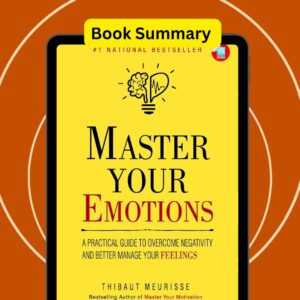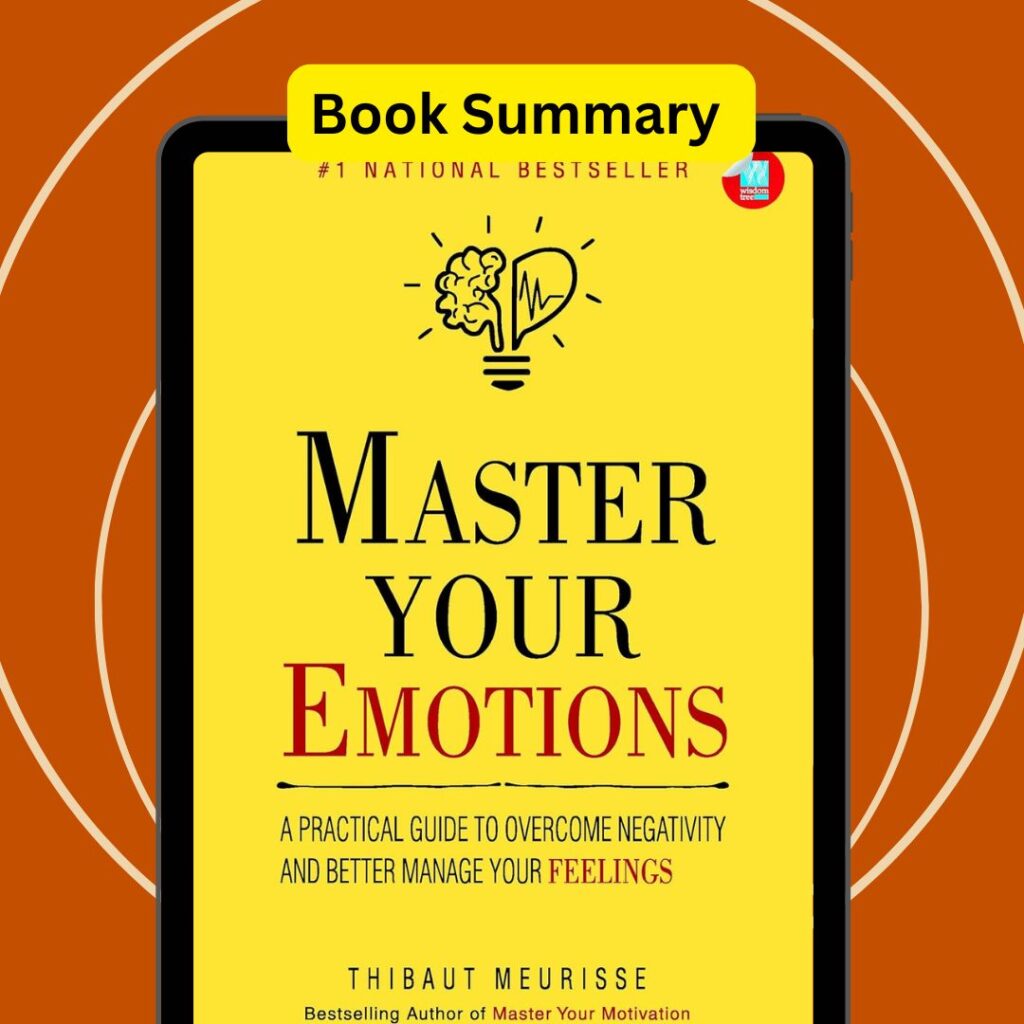Master Your Emotions Summary: Unlocking Emotional Intelligence and Resilience
In today’s fast-paced world, emotions can often feel overwhelming and uncontrollable. Master Your Emotions by Thibaut Meurisse serves as a practical guide to understanding and managing our emotional responses. This self-help book delves into the intricacies of human emotions, offering valuable insights and actionable strategies to help readers harness their feelings for personal growth and fulfillment. In this blog post, we will explore the key themes, concepts, and practical techniques presented in Master Your Emotions, providing a comprehensive summary that empowers readers to take charge of their emotional well-being.

Table of Contents
Thibaut Meurisse: A Brief Biography
Thibaut Meurisse is a psychologist, life coach, and author known for his expertise in emotional intelligence and personal development. With a background in psychology, Meurisse has dedicated his career to helping individuals understand their emotions and improve their mental health. His writing combines psychological principles with practical advice, making complex concepts accessible to a broad audience. Through his work, he aims to empower readers to lead more fulfilling lives by mastering their emotional responses.
Understanding Emotions
The book begins by establishing a foundational understanding of emotions. Meurisse explains that emotions are natural responses to stimuli that arise from our thoughts, experiences, and perceptions. He emphasizes that emotions serve important purposes—they can inform us about our needs, desires, and boundaries.
The Nature of Emotions
Meurisse categorizes emotions into two main types: positive (such as joy and love) and negative (such as anger and sadness). He argues that all emotions are valid and should be acknowledged rather than suppressed. By recognizing the purpose behind each emotion, individuals can learn to respond more effectively.
The Cascade Effect of Thoughts
One of the key concepts in Master Your Emotions is the cascade effect—how our thoughts influence our feelings and behaviors. Meurisse explains that negative thoughts often lead to negative emotions, creating a cycle that can be difficult to break. Conversely, positive thoughts can foster uplifting feelings.
Practical Strategies for Managing Thoughts
To manage this cascade effect effectively, Meurisse provides several strategies:
- Cognitive Reframing: This technique involves changing the way you perceive a situation. By viewing challenges from different perspectives, you can alter your emotional response.
- Mindfulness Practices: Engaging in mindfulness allows individuals to observe their thoughts without judgment. This practice fosters awareness of emotional triggers and helps in managing reactions.
- Journaling: Writing down thoughts and feelings can clarify emotions and provide insights into recurring patterns. Journaling serves as a powerful tool for self-reflection.
Coping with Negative Emotions
Meurisse emphasizes that negative emotions are not inherently bad; they offer valuable insights into unresolved issues or unmet needs. The book outlines several strategies for coping with negative emotions effectively:
- Identify Triggers: Understanding what triggers negative emotions is crucial for managing them. By recognizing patterns, individuals can develop proactive strategies to address these triggers.
- Accepting Emotions: Instead of suppressing negative feelings, Meurisse encourages readers to accept them as part of the human experience. Acknowledging these emotions allows for healthier processing.
- Engaging in Physical Activity: Exercise is highlighted as an effective way to release pent-up energy associated with negative emotions. Physical activity promotes the release of endorphins—natural mood lifters.
- Deep Breathing Techniques: Practicing deep breathing helps calm the mind and body during moments of heightened emotion. This technique can reduce anxiety and promote relaxation.
The Power of Positive Thinking
While acknowledging the importance of addressing negative emotions, Meurisse also emphasizes cultivating positive thoughts as a means of enhancing overall well-being:
- Gratitude Practices: Regularly expressing gratitude shifts focus from what is lacking to what is abundant in life. Keeping a gratitude journal or practicing daily affirmations can foster positivity.
- Visualization Techniques: Visualizing positive outcomes can enhance motivation and self-confidence. This technique encourages individuals to envision success in various aspects of life.
- Surrounding Yourself with Positivity: The people we interact with significantly impact our emotional state. Building relationships with supportive individuals fosters an environment conducive to positive thinking.
Emotional Intelligence
Meurisse highlights the importance of developing emotional intelligence—the ability to recognize, understand, and manage one’s own emotions while empathizing with others:
- Self-Awareness: Cultivating self-awareness allows individuals to identify their emotional responses accurately and understand how these responses affect behavior.
- Empathy: Practicing empathy involves recognizing others’ feelings and perspectives—enhancing interpersonal relationships while fostering compassion.
- Effective Communication: Open communication about feelings promotes healthy relationships and reduces misunderstandings—encouraging deeper connections with others.
Letting Go of Negative Feelings
The book discusses techniques for releasing negative feelings that may hinder personal growth:
- Forgiveness Practices: Holding onto grudges can weigh heavily on emotional well-being; practicing forgiveness allows individuals to free themselves from past hurts.
- Creating New Narratives: Rewriting personal narratives surrounding past experiences empowers individuals to shift focus from pain toward healing and growth.
- Emotional Detachment: Learning to detach from overwhelming emotions enables clearer thinking during challenging situations—allowing for more rational decision-making.
Overcoming Challenges
While mastering one’s emotions offers numerous benefits, challenges may arise during this journey:
1. Resistance to Change
Change can be uncomfortable; resistance may surface when attempting new practices or thought patterns:
- Approach change gradually—start with small adjustments before implementing larger shifts in mindset.
- Celebrate progress along the way; recognizing achievements fosters motivation for continued growth.
2. Fear of Vulnerability
Opening up emotionally can be daunting; however, vulnerability is essential for forming genuine connections with others:
- Practice self-compassion—acknowledge that everyone experiences fear while navigating complex feelings.
- Engage in supportive environments where sharing vulnerabilities feels safe.
3. External Influences
Societal pressures or toxic relationships may contribute negatively towards emotional well-being:
- Limit exposure to negativity by curating your environment intentionally.
- Surround yourself with positive influences who uplift rather than drain your energy.
The Transformative Power of Mastering Emotions
Master Your Emotions illustrates how mastering one’s feelings leads not only toward personal growth but also positively impacts various aspects of life:
- Improved Relationships: Individuals who manage their emotions effectively cultivate deeper connections based on authenticity rather than dependency.
- Enhanced Resilience: Mastery over one’s emotional responses fosters resilience during challenging times—empowering individuals to navigate adversity with grace.
- Greater Life Satisfaction: By embracing positive thinking while addressing negative feelings constructively—individuals experience increased overall happiness and fulfillment in life.
FAQs
1. What is the main theme of “Master Your Emotions”?
The main theme of “Master Your Emotions” revolves around emotional intelligence and the importance of understanding, managing, and transforming your emotions. The book emphasizes that mastering your emotions is essential for personal growth, resilience, and overall well-being.
2. What are some key strategies presented in the book?
Key strategies in “Master Your Emotions” include:
- Identifying and labeling emotions: Understanding what you feel and why.
- Challenging negative thoughts: Replacing unhelpful thoughts with positive affirmations.
- Practicing mindfulness: Staying present to better manage emotional responses.
- Developing emotional resilience: Building the ability to bounce back from setbacks.
3. How does the book define emotional intelligence?
Emotional intelligence is defined as the ability to recognize, understand, and manage your own emotions while also being aware of and influencing the emotions of others. The book highlights that developing emotional intelligence is crucial for improving relationships and achieving personal goals.
4. Is this book suitable for everyone?
Yes, “Master Your Emotions” is suitable for readers of all backgrounds who are interested in improving their emotional well-being. Whether you’re struggling with negative emotions or simply looking to enhance your emotional intelligence, the practical advice offered in the book can benefit anyone.
5. How can mastering emotions improve my life?
Mastering your emotions can lead to:
- Better relationships through improved communication and empathy.
- Greater resilience in facing challenges and setbacks.
- Enhanced decision-making skills by reducing impulsive reactions.
- Increased overall happiness and life satisfaction.
6. Are there any exercises or tools included in the book?
Yes, “Master Your Emotions” includes various exercises, reflection prompts, and practical tools designed to help readers apply the concepts discussed. These activities encourage self-exploration and provide actionable steps to implement emotional management strategies.
7. How has the book been received by readers?
“Master Your Emotions” has been well-received for its clear writing style and practical approach to emotional management. Many readers appreciate its actionable advice and find it helpful in navigating their emotional landscapes, leading to positive changes in their lives.
Conclusion
Master Your Emotions by Thibaut Meurisse serves as an essential guide for anyone seeking greater control over their emotional landscape—a transformative journey toward understanding oneself while fostering healthier relationships with others around us. Through practical strategies rooted in psychological principles—readers are empowered not only to navigate their own complex feelings but also to cultivate deeper connections based on empathy and understanding! As we navigate an increasingly complex world filled with distractions—embracing the principles outlined within this book allows us all not just master our minds but create meaningful connections leading towards fulfilling lives! This comprehensive summary captures essential elements from Master Your Emotions, ensuring it remains engaging for those interested in personal development while emphasizing key messages relevant across generations! This blog post provides an extensive overview while ensuring it remains engaging for readers interested in exploring themes related to emotional mastery through summaries highlighting key aspects throughout Master Your Emotions.
Discover marketing services, interviews & publishing tools at SharingStories.




